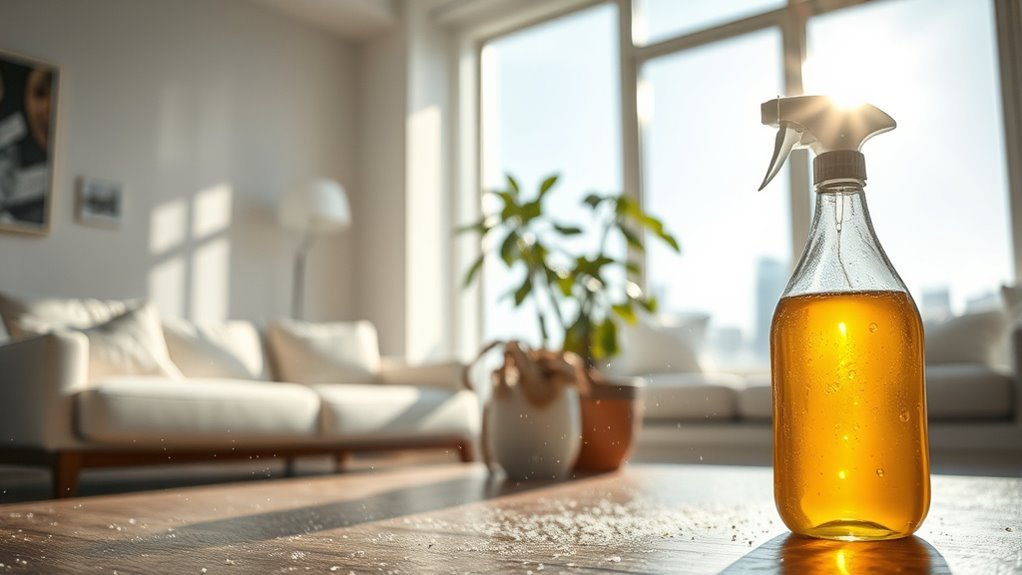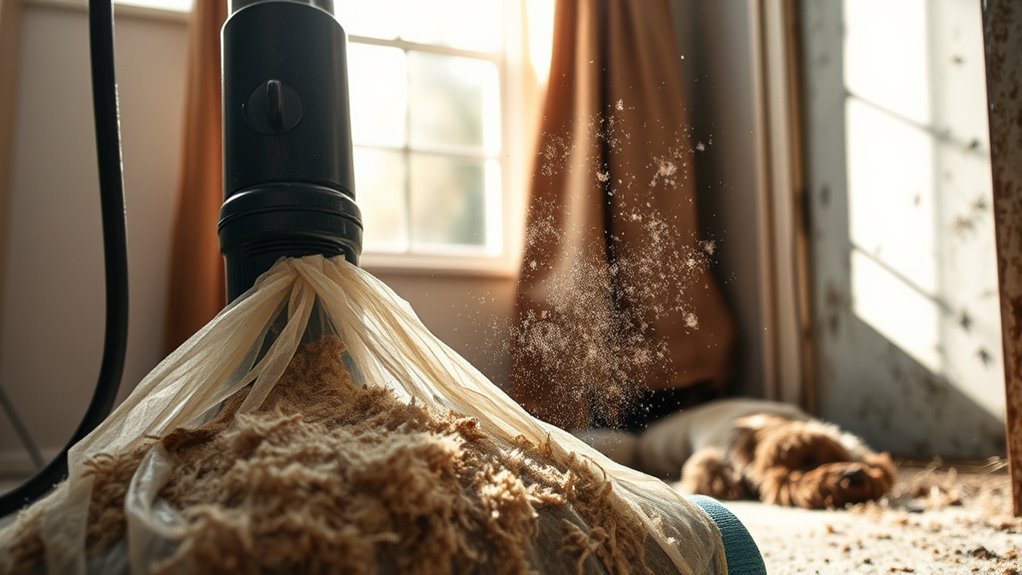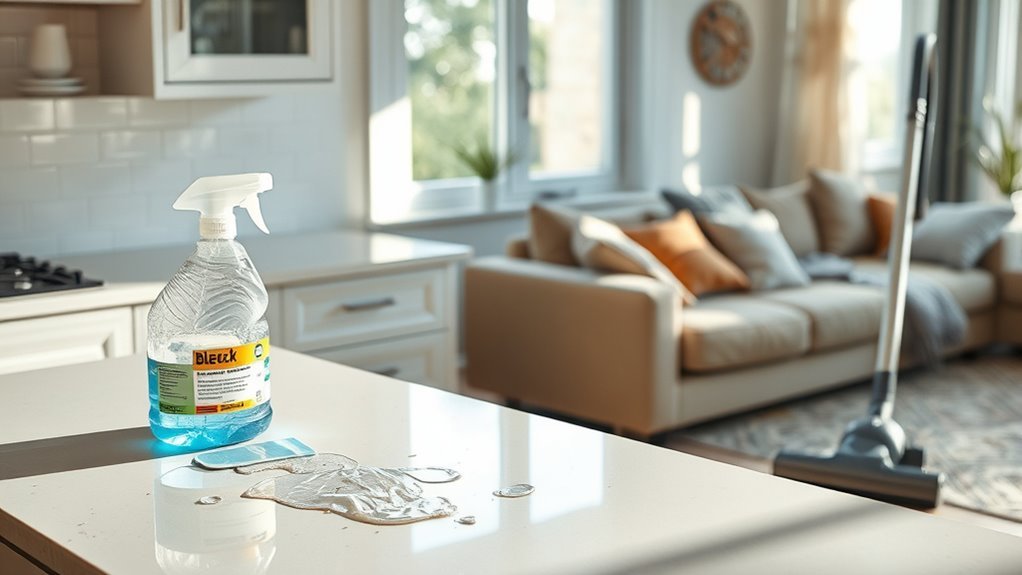Cleaning Mistakes That Damage Your Allergens
You might be spreading allergens by using dry dusting methods that just stir them up instead of trapping them. Ignoring your HVAC system and air filters lets allergens circulate freely. Harsh chemicals can irritate your airways, making symptoms worse. Soft furnishings and carpets often hide allergens, and ineffective vacuums with weak suction don’t clean thoroughly. Plus, neglecting regular washing of bedding and curtains adds to the problem. Keep going to find smarter ways to clean without making things worse.
Using Dry Dusting Techniques That Spread Allergens

Although dry dusting might seem quick and easy, it often just stirs up allergens instead of removing them. When you rely on traditional dusting techniques, you risk sending dust mites, pollen, and pet dander back into the air you breathe. If you want to truly free yourself from these irritants, it’s important to rethink how you dust. Using a dry cloth or feather duster doesn’t trap particles; it just redistributes them, increasing allergen spread. Instead, opt for damp cloths or microfiber dusters that capture dust rather than push it around. This way, you’re not just shifting allergens from one surface to another—you’re actually removing them, creating a cleaner, healthier space where you can breathe easy and enjoy your freedom from airborne irritants.
Ignoring Air Filters and HVAC Maintenance
If you skip regular air filter changes and HVAC maintenance, you’re allowing allergens like dust, mold spores, and pet dander to circulate freely in your home. Neglecting HVAC inspections and filter replacements can trap you in an environment that restricts your freedom to breathe easy. Staying on top of these tasks helps you reclaim control over your indoor air quality.
Here’s what you should keep in mind:
- Schedule HVAC inspections at least twice a year
- Replace air filters every 1-3 months depending on usage
- Use high-efficiency filters designed to trap allergens
- Clean vents and ducts regularly to prevent buildup
- Monitor humidity levels to discourage mold growth
Cleaning With Harsh Chemicals That Irritate Airways

When you rely on harsh cleaning chemicals, you might unknowingly worsen indoor air quality and irritate your airways. These substances can trigger chemical sensitivities and respiratory issues, especially if you crave a home environment free from irritants. Instead, consider gentler options that safeguard your freedom to breathe easy.
| Chemical Type | Common Effects | Better Alternatives |
|---|---|---|
| Bleach | Throat irritation | Vinegar and baking soda |
| Ammonia | Coughing, shortness of breath | Lemon juice |
| Synthetic fragrances | Trigger allergies and asthma | Essential oils (mild) |
Overlooking Soft Furnishings and Carpets
You often don’t realize how much dust, allergens, and pet dander hide in your soft furnishings and carpets. Neglecting regular furniture cleaning and carpet maintenance traps these irritants, limiting your freedom to breathe easy at home. To keep your living space allergen-free, focus on:
Dust and allergens hide deep in your furniture and carpets, making regular cleaning essential for a healthy home.
- Vacuuming upholstered furniture weekly
- Spot-cleaning spills immediately
- Using allergen-proof covers on cushions
- Scheduling professional carpet cleaning every 6-12 months
- Rotating and airing out rugs regularly
Using Ineffective Vacuum Cleaners

If your vacuum cleaner has low suction power, it won’t pick up all the dirt and allergens hiding in your carpets and furniture. Plus, poor filtration systems can release dust back into the air, making allergies worse. Choosing a vacuum with strong suction and a good filter is key to keeping your home truly clean.
Low Suction Power
A vacuum cleaner with low suction power won’t pick up all the dust, dirt, and allergens hiding in your carpets and floors. If you want to breathe freely, you need a machine that can adjust power settings to tackle different surfaces efficiently. Using a vacuum with low suction means allergens stay trapped, making your space less healthy.
Here’s what you should watch out for:
- Weak suction that leaves dirt behind
- Inability to adjust power settings for varied floor types
- Clogged or worn-out vacuum parts reducing effectiveness
- Using an old vacuum that loses strength over time
- Ignoring regular maintenance to keep suction strong
Choosing a powerful vacuum lets you reclaim your freedom from allergens, ensuring your home is truly clean.
Poor Filtration Systems
Although a vacuum may have strong suction, it won’t do much good if its filtration system is poor. You might think you’re clearing allergens, but without good filtration efficiency, dust and particles just get kicked back into the air, keeping you trapped in a cycle of allergy discomfort. To break free, regularly check your vacuum’s filter replacement schedule. Using outdated or clogged filters drastically reduces filtration efficiency, meaning your vacuum doesn’t capture allergens as it should. Choosing a vacuum with a high-efficiency filter, like HEPA, can make all the difference by locking in microscopic particles. Don’t settle for less—upgrading your filtration system empowers you to truly reclaim your space from allergens and breathe easier every day.
Neglecting Regular Washing of Bedding and Curtains
When you skip washing your bedding and curtains regularly, allergens like dust mites, pet dander, and pollen can build up quickly. Neglecting proper bedding frequency and curtain care traps these irritants, limiting your freedom to breathe easy at home. To keep allergens at bay, make washing a priority.
Here’s how to stay on top of it:
- Wash bedding at least once a week in hot water
- Clean curtains monthly or follow manufacturer instructions
- Use allergen-proof covers for pillows and mattresses
- Vacuum curtains regularly with a HEPA filter vacuum
- Air out bedding and curtains to reduce moisture buildup
Häufig gestellte Fragen
Can Pets Increase Allergen Levels Despite Regular Cleaning?
Yes, pets can increase allergen levels even if you clean regularly. Pet dander, tiny skin flakes, sticks to furniture, carpets, and fabrics, making allergen management tricky. You might feel free with your furry friend around, but their dander can trigger allergies if not controlled well. To balance your love for pets and allergen freedom, consider frequent vacuuming with a HEPA filter and washing pet bedding often to keep allergen levels down.
How Often Should Air Purifiers Be Replaced or Cleaned?
You’ll want to stay on top of air purifier maintenance to keep your space fresh and allergen-free. Generally, you should clean or replace filters every 3 to 6 months, but it depends on your model and usage. Some HEPA filters last longer, while others need more frequent attention. Don’t wait until you notice diminished performance—regular filter replacement guarantees your purifier works efficiently, giving you the freedom to breathe easy without hassle.
Are Natural Cleaning Products Safer for Allergy Sufferers?
If you’re seeking safer solutions, natural cleaning products often offer allergy relief with gentle, natural ingredients that won’t aggravate your airways. You’ll appreciate how these products minimize harsh chemicals, making your space fresher and friendlier for sensitive noses. Choosing natural options lets you clean confidently, creating a healthier haven without harmful irritants. So, embrace the freedom to freshen up your home while protecting your allergies naturally and effectively.
Does Humidity Control Affect Allergen Buildup in the Home?
Yes, controlling humidity levels plays a big role in managing allergen accumulation in your home. When humidity’s too high, it creates a perfect environment for mold, dust mites, and other allergens to thrive. You’ll want to keep humidity between 30-50% to limit their growth and breathe easier. By keeping humidity in check, you’re freeing yourself from constant allergy triggers and making your living space more comfortable and healthy.
Can Plants Help Reduce Indoor Allergens Effectively?
Imagine your indoor plants as tiny superheroes, battling airborne villains nonstop! While they can help with allergen reduction by trapping dust and releasing fresh oxygen, don’t expect them to banish allergens completely. You’ll still need to keep your space clean and control humidity. So, enjoy the freedom plants bring to your home’s vibe, but remember they’re just one part of a bigger strategy to keep allergens in check.






